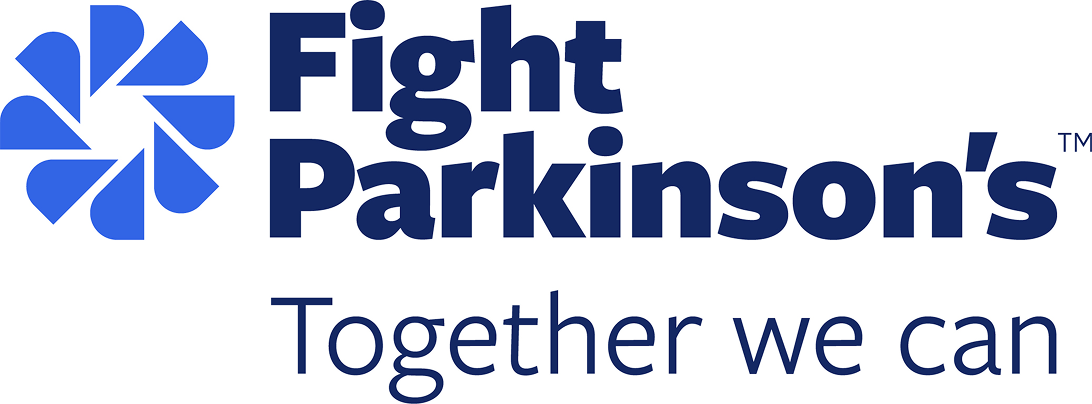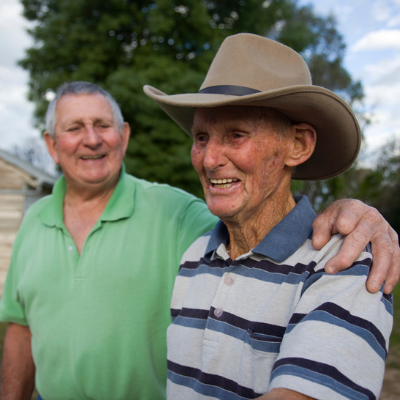Multiple System Atrophy (MSA) is a rare and progressive neurological condition that affects multiple parts of the brain. The gradual loss and shrinkage (atrophy) of nerve cells affects multiple systems in the body and symptoms can be many and varied.
Fight Parkinson’s is Australia’s leading organisation offering support for people with MSA. We have a dedicated commitment to research, education, and support to help people with MSA live full and active lives for as long as possible.
What is MSA?
The parts of the brain affected control movement and balance, along with automatic functions of the body such as bladder control and blood pressure regulation. Symptoms include fainting spells and bladder control problems, combined with motor control symptoms such as tremor, rigidity, and loss of muscle coordination.
The symptoms worsen over time as the condition tends to advance rapidly over the course of 5 to 10 years. The person will experience progressive loss of motor skills, eventually being confined to bed. There is no remission from the condition and there is currently no cure.
MSA is a form of Atypical Parkinson’s, meaning that its symptoms are similar to those experienced by people with Parkinson’s, for example stiff muscles and balance problems. They may present with symptoms similar to Parkinson’s, but the lack of recognition of the non-Parkinson’s symptoms they experience, along with misdiagnosis of their condition can be extremely challenging. There are currently no treatments to cure or slow progression. Some symptoms also resemble other forms of Atypical Parkinson’s such as Progressive Supranuclear Palsy (PSP).
MSA has been called many things, including Olivopontocerebellar Atrophy, Striatonigral Degeneration, Parkinson’s Plus and Shy-Drager Syndrome. The confusion caused by the various names led to an international consensus by medical experts in 1996 to use the term Multiple System Atrophy (MSA).
What are the symptoms of MSA?
Symptoms vary from person to person. Early symptoms include bladder problems, constipation, erectile dysfunction in men (inability to achieve or sustain an erection), sleep disturbance, movement problems such as stiff muscles and dizziness caused by low blood pressure. Different symptoms are experienced depending on the part of the brain affected, as follows:
- movement problems – related to the basal ganglia
- slow movements
- stiff muscles
- handwriting – small and spidery
- difficulty turning in bed
- poor balance and coordination – related to the cerebellum
- clumsiness
- difficulty fastening buttons
- unsteady on the feet
- loss of balance
- slurred speech
- autonomic difficulties
- bladder problems
- dizziness or fainting (blood pressure problems)
- cold hands and feet
- problems with sweating control
Other problems:
- weakness of arms and/or legs
- unusual emotional response: laughing/crying
- restless sleep
- nightmares
- noisy breathing and/or snoring
- unintentional sighing
- weak/quiet voice
- swallowing problems, difficulty chewing, choking episodes
Many people are initially diagnosed with Parkinson’s due to the similarity of symptoms. Treatments for Parkinson’s are generally not as effective in treating MSA. Symptoms get worse over time, but the rate of progression varies from person to person.
What causes MSA?
We don’t know what causes the shrinkage of brain cells in MSA but we do know that structures called glial inclusion bodies containing an abnormal protein called alpha-synuclein seem to be involved. Further research is underway into why and how the cells become damaged in people with MSA. Contact Fight Parkinson’s or your neurologist for further information about participating in MSA trials.
Who gets MSA?
MSA is a relatively rare condition, although the number of people diagnosed is increasing as improved knowledge makes it easier to recognise and diagnose. In Australia, there are currently thought to be around 2500 people with MSA. People with MSA usually begin to get symptoms between the ages of 50-60 years, however MSA has been found in people much younger and older. MSA affects both men and women from all backgrounds and lifestyles.
Is MSA inherited or passed on through families?
There is no evidence to suggest that MSA runs in families, however recent research indicates that genetic factors can make a person more likely to develop MSA. In other words, there may be some genetic susceptibility that makes some people more at risk than others, but MSA rarely affects more than one person in a family.
Can MSA be treated?
Treatments and therapies are available to help manage symptoms of MSA, however there is no cure, and we don’t know of any way to prevent it from occurring or slow its progression. It’s important that people with MSA see a neurologist, preferably one with expertise in movement disorders. Depending on symptoms, it’s also important to seek the advice of other healthcare professionals with expertise in the condition, such as a physiotherapist, occupational therapist, speech pathologist (speech therapist), or counsellor. Fight Parkinson’s can provide information about neurologists and other healthcare professionals in your area.
Is MSA fatal?
MSA cannot be cured, so everyone with MSA experiences deterioration prior to death. Initial symptoms become more severe over time and new symptoms may develop. As the condition progresses, people with MSA are at risk of developing serious complications such as pneumonia, bacterial infections or pulmonary embolism. People with MSA typically live for around 9 years after the onset of symptoms. Research into MSA is currently underway giving us hope for the future, particularly in relation to more effective management of symptoms.
How is MSA diagnosed?
MSA is difficult to diagnose. There are no blood tests or brain scans that can diagnose it, although tests and scans are commonly used to rule out other conditions that can cause similar symptoms. As MSA occurs in the brain, a diagnosis can only be confirmed at postmortem. Improved brain scanning techniques can show abnormalities in some patients with MSA, but ordinary brain MRIs are often normal.
It’s common for people with early symptoms of MSA to be misdiagnosed with Parkinson’s. A limited response to Parkinson’s medications is a key indicator of the need to review a diagnosis of Parkinson’s. Because MSA is rare, many doctors are not even aware of the condition and don’t know what symptoms to look for. It’s important to see a neurologist. People with MSA should visit their neurologist regularly for ongoing treatment and advice. If possible, see a neurologist with expertise in movement disorders as they are more likely to be up to date with the latest advances in treatment and management.
Coming to terms with a diagnosis of MSA
People may experience a range of feelings after being diagnosed with MSA. Most people experience a feeling of grief, which may include fear, sadness, denial, anger or concern for the future. Some people may experience a feeling of relief at having a name for the difficulties they have been experiencing after searching so long for answers. It is important to have a safe space in which to work through these feelings of grief and be aware that those around you will be experiencing the same range of emotions. Speaking to a counsellor can help you to come to terms with your feelings and make meaning of the situation. Getting information and support can help you to adjust to the diagnosis and begin to make changes that will help with the daily management of the condition. Remember, you are not alone and help is available. The best place to start is by contacting Fight Parkinson’s.
Where can I go for further information and support?
MSA is a complex and challenging condition. It’s important to get help and to communicate your needs. Fight Parkinson’s provides information and support for people with MSA and their families and carers. We also provide a free telephone interpreter service for people who speak a language other than English.
- information and emotional support – either over the phone or in person
- therapies and resources to maintain independence
- financial support and assistance
- support groups where you can share your experiences and learn from others
- help with personal care, such as bathing, dressing, and eating
- home delivered meals and other food services
- home help for assistance with housework, laundry, and shopping
- help for carers, including information, counselling, advice, and respite to help them take a break from caring.
For further information about services that can help, contact Fight Parkinson’s or your local council. The Commonwealth Respite and Carelink Centre on 1800 052 222 can also provide information about services in your local area.
Atypical Peer Support Group meetings
Fight Parkinson’s holds a bi-monthly online support group for people living with MSA. If you’re interested in attending an online meeting or would like to know more, please call us on
03 8809 0400 or email us at [email protected].
You are not alone
No-one has to face MSA alone.
Our health team offers national specialist support for individuals and families and can help with information on symptom management, services, health-related benefits and entitlements and everyday living. As families and people affected by MSA often come into contact with healthcare professionals with no or limited knowledge of their condition, we can also provide specific information for, and advocate on your behalf, to medical and healthcare professionals.
This service is available by phoning 03 8809 0400 from 9am – 5pm on weekdays.
Resources
Fight Parkinson’s provides a range of resources and publications that can assist people living with MSA, their families and carers to feel more informed about the condition. We are also committed to funding research that will provide life quality outcomes for people living with MSA and ultimately, find a cure.
COVID-19 information
People with Atypical Parkinson’s – and their carers – need to continue to take precautions to prevent exposure to the Coronavirus. This is because COVID-19 can infect the entire respiratory system and is likely to cause pneumonia, especially in people living with pre-existing conditions.
Learn more about COVID-19 and MSA
A world-wide approach
Fight Parkinson’s is one of 12 associations working as a single international body to deliver an increased focus into PSP|CBD research.
PROMOTUS, the PSP|CBD Global Alliance was formed in June 2019 to:
- represent the views of national PSP|CBD associations, providing a single point of contact for pharmaceutical companies and researchers
- provide best practice care and support for people affected by the conditions
- encourage research into PSP|CBD and ensure that research outcomes are disseminated around the world
- partner with pharmaceutical companies and biotechs to facilitate easier access to patients for clinical trials
- grow the network of PSP|CBD associations around the world to reach and support more people affected by the conditions.
The information here is presented as a guide; it’s important to discuss all symptoms and management strategies with your neurologist and other healthcare professionals.




